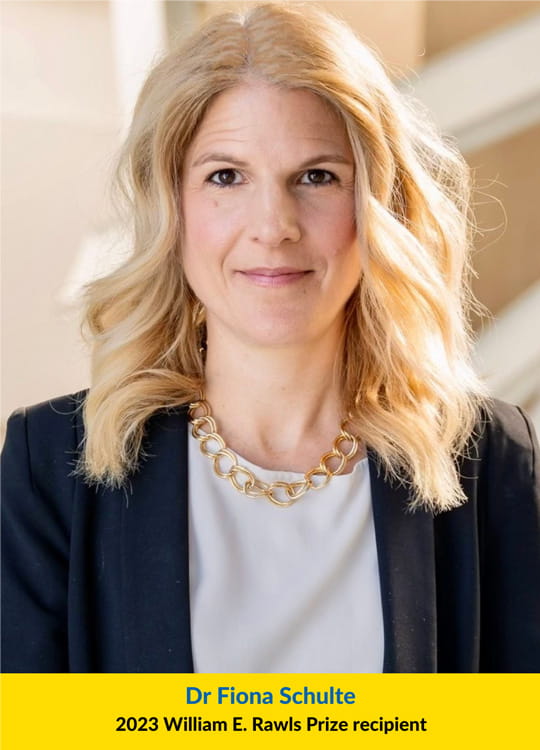2023 Awards for Excellence Winners
Now in its 30th year, we are proud to present the 2023 Award for Excellence Winners.
Since 1993, we have acknowledged some of the country’s best researchers with our Canadian Cancer Society Awards for Excellence. We are proud to honour these talented individuals who have played a key role in the advancement of cancer research. These individuals have made rich and meaningful contributions, whether in advancing biomedical cancer research or conducting research that has made a major impact on cancer control in Canada.
Congratulations to all our award winners!Canadian Cancer Society Lifetime Contribution Prize
Dr John Bell
Recipient, 2023 Lifetime Contribution Prize
Senior Scientist, Cancer Research Program, The Ottawa Hospital
Professor, Department of Medicine, Faculty of Medicine, University of Ottawa
Dr John Bell is an internationally recognized leader in the discovery and application of cancer-killing viruses and treatments that harness the body’s immune system to fight cancer.
In 2000, Dr Bell made the groundbreaking discovery that as cancer cells evolve, they develop genetic defects that make them more susceptible to viruses. He was one of the first scientists to exploit this weakness and develop a completely new class of cancer therapy: oncolytic virotherapy, which uses genetically engineered viruses to kill cancer cells without harming healthy ones.
A few years later, Dr Bell was part of a team of researchers that successfully led a clinical trial to prove that administering cancer-killing viruses in the blood of people with cancer was safe and effective. Later, they showed that these therapies are most successful in the early stages of the disease. His research has also found new ways to make this kind of treatment more effective, for example, by completing the first clinical trial in the world to use two viruses, one to prepare the immune system to fight cancer and another to boost the response. Additional studies have demonstrated the potential of combining cancer-killing viruses with other drugs and biotherapeutics.
Dr. Bell has also played a key role in boosting Canada’s capacity to manufacture cancer-killing viruses, CAR-T cells and other biotherapeutics for clinical trials. He helped to create The Ottawa Hospital’s Biotherapeutics Manufacturing Centre in 2006 and is now leading a Canada-wide biomanufacturing collective. He also founded or co-founded BioCanRx (Canada’s Immunotherapy Network), the Canadian Pandemic Preparedness Hub and several biotechnology companies as part of his dedication to translating discoveries into benefits for patients.
Dr Bell is known as a kind and supportive mentor who encourages his trainees to innovate and collaborate. The diversity of trainees he has mentored spans every domain, from fundamental cancer research to clinical trials and industry.
He has an outstanding record of engaging the public and patient groups, demonstrating his commitment to collaborating with people living with or beyond cancer. He was awarded the inaugural European Society for Gene and Cell Therapy (ESGCT) Public and Patient Engagement Award, the first of its kind offered by ESGCT.
Dr Bell has served on the board of directors of the Canadian Cancer Society (and the former National Cancer Institute of Canada) and has chaired the organizing committees for over 16 international conferences on oncolytic virus therapeutics. In 2011, he received CCS’s Robert L. Noble Prize. He is a fellow of the Royal Society of Canada and the Canadian Academy of Health Sciences.
With his discoveries and leadership, Dr Bell is a great example of a life dedicated to pursuing knowledge as well as collaboration and mentorship, advancing cancer treatments and bringing discoveries to the people who need them.
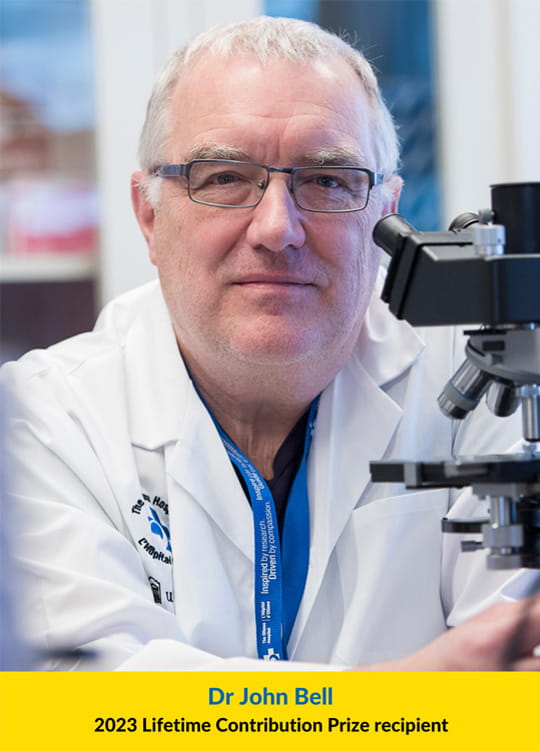
Canadian Cancer Society Inclusive Excellence Prize
Dr Mandana Vahabi
Recipient, 2023 Inclusive Excellence Prize
Professor and Women's Health Research Chair, Lawrence Bloomberg Faculty of Nursing, University of Toronto & Unity Health Toronto - St. Michael Hospital
Scientist, ICES (formerly known as Institute for Clinical Evaluative Sciences)
Adjunct Professor, Daphne Cockwell School of Nursing, Toronto Metropolitan University
Dr Mandana Vahabi is an accomplished researcher and scholar who has dedicated her career to research that addresses the needs of people and communities that face systemic barriers when accessing social and health systems.
With a unique background in nursing and social epidemiology, her research focuses on how social factors affect chronic diseases and health equity, especially in cancer screening for disadvantaged groups. Combining scientific expertise in social epidemiology with community-based approaches, she works collaboratively with marginalized communities, health policymakers and government agencies alike. She is passionate about advancing health equity through socially engaged research and sharing culturally appropriate information.
Dr Vahabi works with equity-deserving communities and researchers from different fields, both locally and globally, to create new ways to improve cancer screening for everyone. She uses robust epidemiological methods and emerging analytic tools for large databases in her research to create new knowledge that can be used to improve programs and policies for everyone.
Dr Vahabi has secured more than $15 million in research funding from various sources, including the Canadian Cancer Society. She has led 39 projects, with more than a third of them focusing on studying why marginalized groups face differences in cancer screening access. Her dedication to improving women’s access to cervical cancer screening has led to the development of effective cervical cancer screening strategies that prioritize inclusivity and women's preferences. She is currently working on projects using HPV self-sampling technology and sexual health education to reach low-income rural and urban women in India, as well as under- or never-screened sex workers and women with a history of incarceration in Toronto.
Through her outstanding research in population health, Dr Vahabi has significantly improved our understanding of cancer screening disparities. She is a dedicated researcher and educator who values methodological rigour and respects the experiences of affected communities. Her work contributes to advancing cancer research and promoting equity in healthcare.
Owing to her integrated approach to mentorship, research and engaged action for social change, Dr Vahabi is empowering community partners by sharing knowledge about cancer screening research and enhancing their ability to participate in equitable research collaborations.
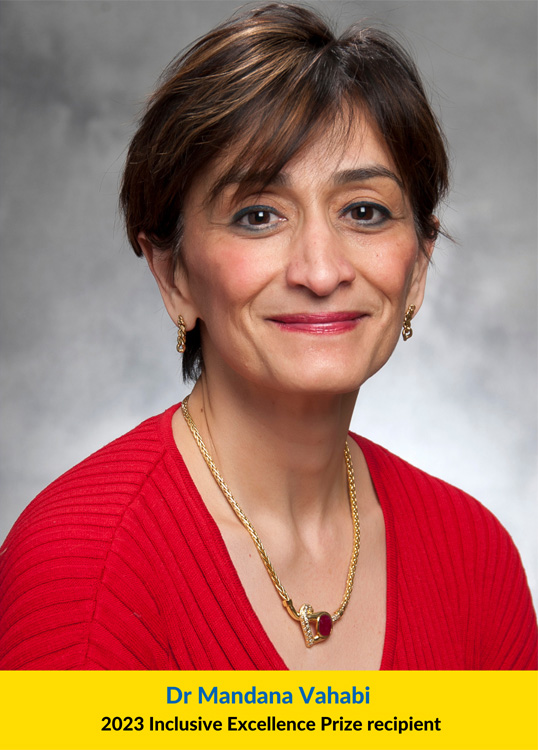
Canadian Cancer Society O. Harold Warwick Prize
Dr Jacques Simard
Recipient, 2023 O. Harold Warwick Prize
Vice-Dean of Research and Innovation, Faculty of Medicine, Université Laval.
Director, Cancer Genomics Laboratory, CHU de Québec-Université Laval Research Centre
Dr Jacques Simard has devoted his career to understanding how genetics make some people more likely to get breast, ovarian and prostate cancers, which has led to the development of risk assessment tools to improve prevention, early detection and treatments of these cancers.
Dr Simard played a leading role in the discovery of the complete structure of the breast, ovarian and prostate cancer susceptibility gene BRCA2, and furthered our understanding of BRCA1 gene mutations, particularly in families in Canada in the mid-1990s.
His foundational collaborative work was the cornerstone for the development of a screening test for predisposition to some cancers. This breakthrough has since enabled millions of high-risk people to be tested for the presence of mutations in these genes, improving prevention, early detection and treatment.
He was the chairholder of the Canada Research Chair in Oncogenetics from 2001 to 2022 and has led one of the largest interdisciplinary research teams and played a key role in an several international studies on genetic predisposition to breast cancer, which includes thousands of participants worldwide.
He is currently leading an implementation project to generate evidence on the feasibility, acceptability and cost-effectiveness of risk-based breast cancer screening. This paradigm shift will make it possible to adapt the methods and frequency of screening to better serve women who are at higher risk of the disease. This will be especially beneficial for younger women, who are not covered by screening programs that mainly use age as an eligibility criterion.
Through his significant research and international leadership, Dr Simard’ has contributed vital information on how cancer develops and much-needed knowledge to create personalized tools that have significantly impacted how we prevent and detect the disease, ultimately saving countless lives of people at higher risk.
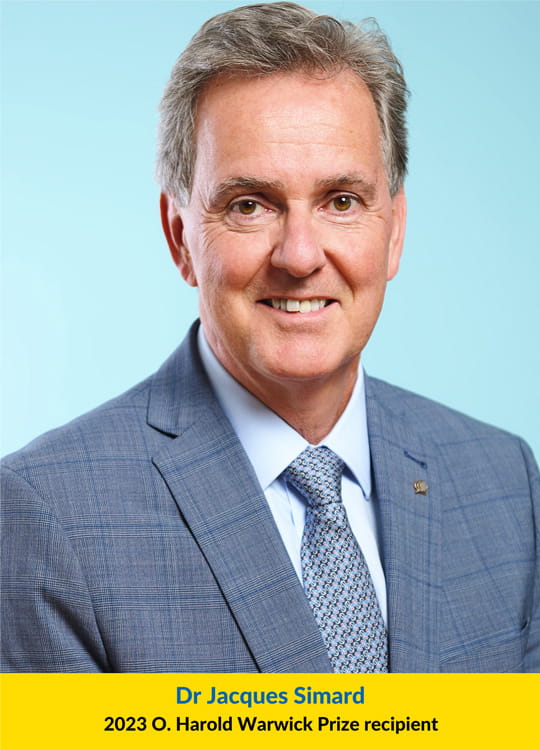
Canadian Cancer Society Robert L. Noble Prize
Dr Peter Dirks
Co-recipient, 2023 Robert Noble Prize
Senior Scientist, Development and Stem Cell Biology, The Hospital for Sick Children Head, Division of Neurosurgery, The Hospital for Sick Children
Professor, Department of Molecular Genetics and Laboratory Medicine and Pathology, University of Toronto
Dr Peter Dirks is an exceptional and internationally recognized neurosurgeon-scientist who has made significant contributions to our understanding of how brain cancers work.
His research focuses on the biology of brain tumours in children and adults, with a primary aim to figure out how the natural processes in brain cells go wrong and lead to hard-to-treat cancers. In 2004, his team was the first to discover cancer stem cells in human brain tumours. This discovery has attracted global attention and earned him numerous accolades. More importantly, it has launched an entire research field connecting stem cells and cancer biology.
Having performed hundreds of brain tumour surgeries over his career, Dr Dirks uses his clinical experience to bridge the gap between bedside care and scientific research, leading to significant advancements in medicine. His approach has resulted in numerous groundbreaking achievements. Despite his demanding role as a neurosurgeon specializing in complex brain tumours and vascular issues in young people, Dr Dirks has also made notable contributions to basic science research.
Equally impressive is Dr Dirks’s record of citations that demonstrate his global influence and leadership in brain tumor research. His work, which includes more than 230 peer-reviewed publications, has been cited more than 49,500 times and his articles are among the top 1% most cited in his field.
Over the past 20 years, Dr Dirks has been a driving force in brain cancer research, achieving significant milestones. Supported by funding from organizations like the Canadian Cancer Society (which he credits as instrumental in launching his research career), he and his team are dedicated to deepening our understanding of cancer to create better treatments for patients facing these challenging tumours.
Through his discoveries, Dr Dirks is reshaping how researchers seek new precision-based medicines that could improve outcomes for people affected by brain tumours.
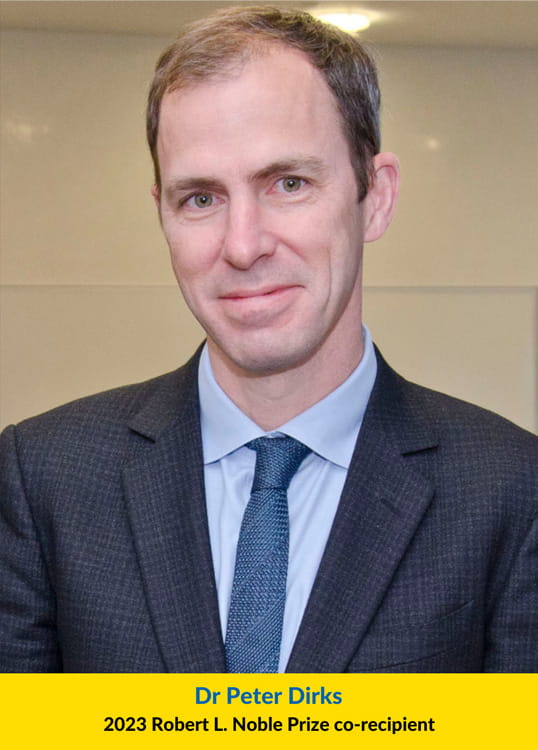
Dr Sheila Singh
Co-recipient, 2023 Robert L. Noble Prize
Professor of Surgery and Biochemistry, University Scholar, Pediatric Neurosurgeon, McMaster Children’s Hospital
Division Head of Neurosurgery, Hamilton Health Sciences
Director, Centre for Discovery in Cancer Research, McMaster University
Dr Sheila Singh is one of the foremost pediatric neurosurgeons in Canada. Her accomplishments in the areas of research, clinical scholarship, mentorship and education have contributed significantly to cancer research.
A specialist in stem cell biology, Dr Singh is well-known for being the first scientist to isolate a specific type of abnormal stem cell found in the central nervous system. These cells are linked to 12 different types of brain tumours, including pediatric medulloblastoma, the most common brain tumour in children. This groundbreaking discovery, which was supported by the Canadian Cancer Society, has led to numerous studies in her lab aimed at understanding how brain tumours develop.
Throughout her career, Dr Singh has secured 104 grants, totalling more than $28 million in funding. She has also published more than 230 manuscripts in peer-reviewed journals and filed 17 patents. She owns a substantial amount of intellectual property relating to her discovery of cancer stem cells and the use of a specific stem cell marker.
Recently, her 2022 Cancer Cell paper unveiled a new treatment for a subtype of medulloblastoma. This discovery sparked global interest and has been validated by other research groups at Harvard University in different brain cancer models. The teams are working together to prepare for clinical trials.
In her lab and through the many programs she leads, Dr Singh fosters a positive learning environment for trainees, postgraduate fellows, residents and neurosurgical fellows and clinical scholars. She champions equity, diversity and inclusion, and actively recruits students from underrepresented groups, working to remove any barriers and enabling them to achieve their educational and career goals. She has developed research and academic programs across the spectrum of brain cancer and was the inaugural director of the McMaster Surgeon Scientist Program for the Royal College of Surgeons.
Through her exceptional achievements, Dr Singh has made a profound impact on the lives of thousands of people affected by brain cancer around the world.
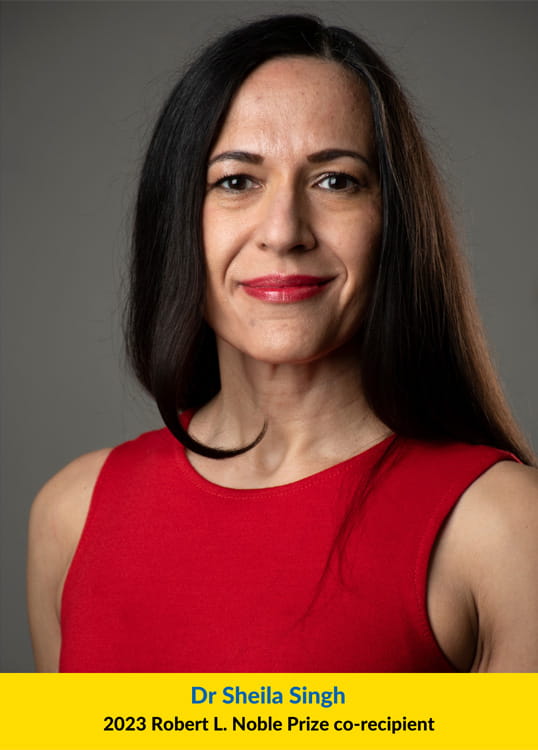
Canadian Cancer Society Bernard and Francine Dorval Prize
Dr Ryan Morin
Co-recipient, 2023 Bernard and Francine Dorval Prize
Professor, Department of Molecular Biology and Biochemistry, Simon Fraser University
Distinguished Scientist, and Bioinformatics Group Lead, Centre for Lymphoid Cancer, BC Cancer
Dr Ryan Morin is a national and international leader in his field of studying how changes to our genes lead to cancer. He has conducted cutting-edge research that has directly helped doctors understand, diagnose and better treat lymphomas.
As a scientist, Dr Morin studies how a type of white blood cancer cell works by analyzing a lot of genetic information gathered from reading DNA. He was one of the first to use advanced gene-reading technology to measure how active tiny genetic molecules are in cells and to identify spelling errors (mutations) in these molecules in cells. He played a key role in some of the earliest efforts to search for mutations in all the genes in cancer cells.
Throughout his career, Dr Morin has used these methods to study different types of lymphoma. His team has discovered numerous genes commonly mutated in these cancers. They have uncovered new categories of diffuse large B cell lymphoma, Burkitt lymphoma and follicular lymphoma based on molecular differences. Some of the identified genes and mutations have led to new treatments.
His recent work in uncovering molecular subtypes of Burkitt lymphoma has been described as the most important advance in researchers’ understanding of this disease in the last decade and is likely to help redefine the methods for diagnosis and treatment of adults with this aggressive cancer.
Dr Morin has contributed to 118 peer-reviewed articles over his academic career, with 22 as senior or co-senior author. He has also contributed 8 invited review articles and 4 book chapters. In total, these publications have been cited almost 23,000 times.
As a professor, Dr Morin applies the same dedication and creativity to teaching as he does to research. He mentors several undergraduate students each year for research projects and supervises a large group of graduate students and postdoctoral fellows who regularly contribute to papers in high-impact journals and present at national and international conferences.
Through the significant progress he has made in his research, Dr Morin is advancing our understanding of lymphoma biology and improving patient care and outcomes.
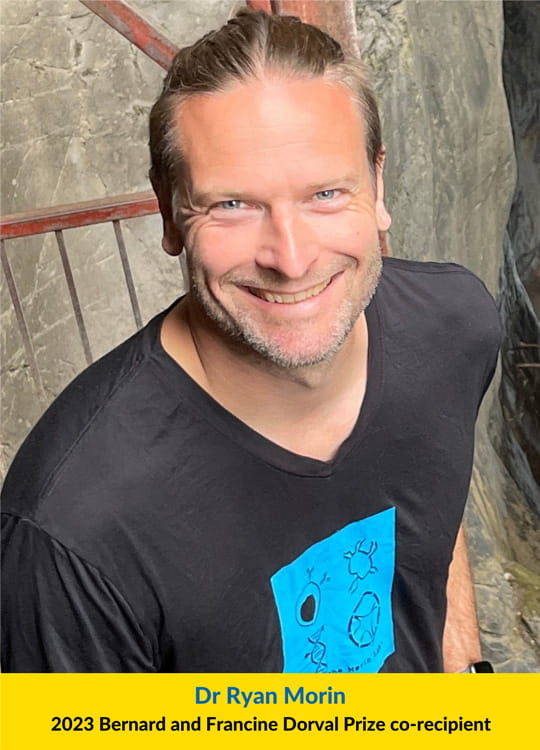
Dr Adam Shlien
Co-recipient 2023 Bernard and Francine Dorval Prize
Professor, Laboratory Medicine and Pathobiology, University of Toronto
Senior Scientist, Genetics & Genome Biology and Laboratory Director, Division of Genome Diagnostics, The Hospital for Sick Children
Garron Family Chair in Childhood Cancer Research
Dr Adam Shlien is an outstanding researcher who is internationally recognized for his discoveries on how cancer starts and develops and for creating cutting-edge computer-based DNA analysis tools to save and improve lives.
Early on in his career, Dr Shlien made a big breakthrough by discovering how cancer starts. He and his team found that if cells can’t properly fix damaged DNA, it can lead to cancers with a lot of mutations.
He has also worked to advance a new generation of computational DNA sequencing tools that can be routinely used by oncologists. These algorithms, which determine the order of the chemical building blocks of DNA, can be seamlessly integrated directly into the clinic for the benefit of people with cancer.
Another of his key discoveries relates to the origins of sarcomas (bone and soft tissue cancers) in children and young adults. Dr Shlien found that these can develop over longer periods than previously believed, which has been very useful for earlier detection and treatment. Dr Shlien recently discovered a similar early mutation mechanism in a rare hereditary disorder called Li-Fraumeni syndrome.
Most recently, Dr Shlien has developed a highly accurate, inexpensive, pan-cancer diagnostic test that can classify over 455 subtypes of cancer. This test has the potential to be an all-encompassing diagnostic tool for pediatric cancers worldwide.
Dr Shlien's significant contributions to our understanding of cancers in children and young adults are currently being translated into clinical practice and forming the basis for much-needed cancer treatments for children and adults.
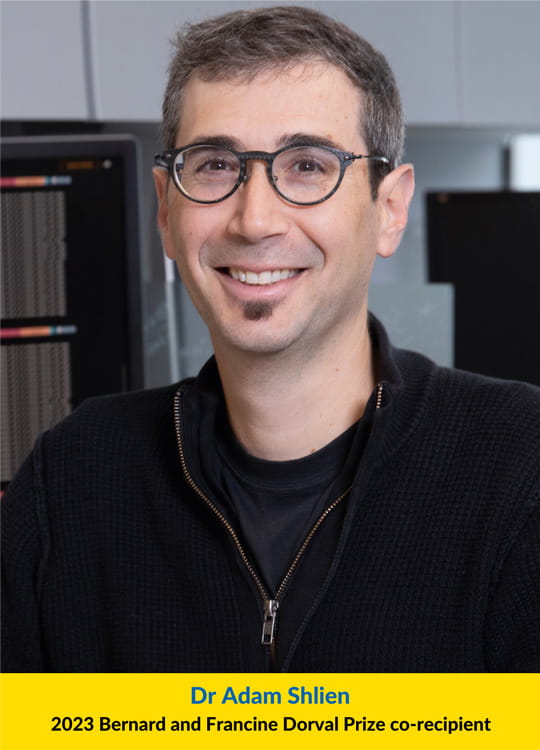
Canadian Cancer Society William E. Rawls Prize
Dr Fiona Schulte
Recipient, 2023 William E. Rawls Prize
Associate Professor, Department of Oncology, Division of Psychosocial Oncology, Cumming School of Medicine, University of Calgary
Registered Psychologist, Hematology, Oncology and Transplant Program, Alberta Children's Hospital
Dr Fiona Schulte is a researcher and global leader in psychosocial oncology whose work is improving the cancer experience for children, adolescents and young adults diagnosed with cancer and their families.
Specifically, her research advocates for the mental health needs of these young people. She has also made significant contributions to her field by studying the experiences among survivors of childhood cancer.
Dr Schulte holds significant leadership roles locally, nationally and internationally. She is 1 of 50 global experts participating in the World Health Organization Global Initiative for Childhood Cancer. In addition, she served as president of the Canadian Association of Psychosocial Oncology from 2019–2021. In 2019, she chaired the International Psychosocial Oncology Global Congress, which was held in Banff, Alberta.
Dr Schulte was appointed chair of the psychosocial task force for the Children’s Oncology Group Long-term Follow-up Guidelines. The Children’s Oncology Group is the world’s largest organization devoted exclusively to childhood and adolescent cancer research and the guidelines are distributed to more than 10,000 experts in cancer worldwide. In her role, she is responsible for leading a team that reviews the latest research on the surveillance of psychosocial outcomes, including pain, sleep and fatigue.
Dr Schulte has supervised trainees at all levels of education who have an exceptional track record of obtaining competitive federal and provincial funding. She also has a strong history of embedding equity, diversity and inclusion considerations in her work and within her lab, specifically as they relate to race, ethnicity, gender and sexual orientation.
She has demonstrated her leadership in many spheres of cancer research worldwide and will continue to make a significant impact in improving the lives of children, adolescents and young adults with cancer and survivors.
